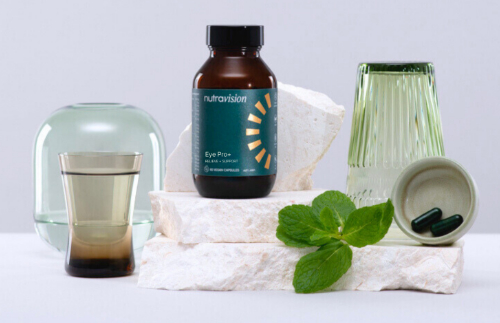
Vitamin B12, especially in its methylcobalamin form, is an extraordinary nutrient responsible for our overall body health and functioning.
This vital vitamin is frequently highlighted for its positive effects on the nervous system and energy, but did you know it also plays a significant role in maintaining proper eye health?
We live in a world dominated by screens and are beginning to see their effects on our eye health. Our modern nutrient-deficient diet also wreaks havoc on our vision and eye health, especially as we age.

Eye strain from digital screen overexposure
So, what’s the solution?
Eye health supplements with essential nutrients have emerged as one of the best answers to the many challenges our eyes face- and at the forefront is vitamin B12.
The role of this crucial vitamin in preserving vision and preventing age-related ocular conditions has been well documented in the scientific literature.
Let’s explore this amazing nutrient and why it should be on your supplement list for eye health.
Understanding Vitamin B12 and Its Forms
Vitamin B12 is one of the important water-soluble vitamins that plays a crucial role in catalysing various biochemical reactions in your body. This critical nutrient regulates reactions everywhere, from DNA synthesis to red blood cell formation.
While it is essential for the body, your body cannot produce it, and it needs to come from diet or supplementation.
You might be surprised that not all vitamin B12 is the same. It comes in two distinct forms – methylcobalamin and cyanocobalamin. Although they have the same fundamental function in the body, their differences are substantial, especially in absorption and delivery.
Methylcobalamin, the natural form of cobalamin in food, has better bioavailability.
It is the biologically viable and active form of vitamin B12, which does not need conversion and can immediately take part in chemical reactions after absorption.
On the other hand, cyanocobalamin, an artificial substance present in most supplements and fortified foods, needs to be converted into an active compound in the body.

Molecular formula of methylcobalamin
Methylcobalamin, but not cyanocobalamin, also plays a crucial role in converting homocysteine, an amino acid, into methionine, thereby reducing homocysteine levels in the blood. Elevated homocysteine is a risk factor for heart disease, as it can damage blood vessel walls, promoting atherosclerosis and potentially leading to heart and eye complications.
So, if you plan to take supplements containing vitamin B12, it is better to use methylcobalamin over cyanocobalamin.
Vitamin B12 and eyes
Methylcobalamin, a natural form of vitamin B12, has become popular due to its considerable benefits to the eyes. It engages in several cellular actions and has demonstrated unique efficacy for protecting healthy vision.
Consequently, the topic of vitamin B12 and eyes has garnered considerable attention.
One of the significant functions that methylcobalamin plays in maintaining eye health is its contribution to the functionality of optic nerves. Vision depends on the optic nerve since it transmits visual information from the retina into the brain. Vitamin B12 deficiency can lead to optic neuropathy, a condition that may result in progressive and potentially irreversible vision loss if not treated.

The visual pathway from the eye via the optic nerve to the brain
Methylcobalamin plays a part in maintaining myelin sheath, the protective casing that wraps around nerve fibers, including the optic nerve. This sheathing is crucial for the efficient and fast propagation of electrical signals. As a result, any damage or deterioration in the myelin sheath around the optic nerve can cause visual defects or even blindness.
Long term oral administration of methylcobalamin was effective in maintaining visual field function in normal tension glaucoma patients.
Dr Yoshio Yamazaki, Current Therapeutic Research, 2000
Methylcobalamin also aids in the recovery of nerve function. Its effects include upregulating neurotropic factors, crucial for nerve survival and regeneration, which are particularly beneficial in cases of nerve injuries. In particular, it has shown promise in protecting retinal ganglion cells, which are crucial for vision, particularly for those with glaucoma.
Methylcobalamin contributes to lowering the homocysteine level in the body as well. High levels of this amino acid have been linked with eye diseases, such as macular degeneration and glaucoma. By reducing homocysteine levels, methylcobalamin contributes to eye health by potentially reducing the risk of macular degeneration and glaucoma, both important causes of vision loss worldwide.
Participants who reported supplementary vitamin B12 intake had 47% reduced risk of any incident age-related macular degeneration.
Dr Bamini Gopinath, American Journal of Clinical Nutrition, 2013
In addition to these benefits, in one of the studies published in the Journal of Ophthalmology, researchers discovered that oral supplementation with methylcobalamin can relieve dry eye symptoms, including pain and photophobia.
Another study has shown that treatment with methylcobalamin may improve visual accommodation – a function of the eye focusing from far to near objects. It implies possible advantages for people affected by changes in vision due to age.
I Eat Plenty of Vitamin B12. Do I Still Need Supplements?
When considering whether you need eye health vitamins despite eating a B12-rich diet, it’s essential to understand both dietary sources of vitamin B12 and how your body absorbs it.

Dietary sources of vitamin B12
Vitamin B12 is naturally contained in animal products such as meat, fish, poultry, eggs, and dairy. For people with a diet full of these foods, their vitamin B12 is usually sufficient.
However, some variables can significantly influence vitamin B12 absorption and use.
- Age is a significant determinant. As you grow older, the capacity of your body to assimilate vitamin B12 from food reduces. It is partly attributed to a decrease in the synthesis of hydrochloric acid in gastric juice of the stomach, which plays a vital role in vitamin B12 absorption. People over 50 are often advised to get their vitamin B12 from supplements or fortified foods.
- Also, some medical conditions and drugs may affect vitamin B12 absorption. Examples of these are gastrointestinal disorders such as Crohn’s disease or coeliac disease, metformin for diabetes, and some acid reflux drugs. If you have these ailments or are taking such drugs, then eye health supplements might be necessary.
- In addition to this, vegetarians and vegans have a predisposition for vitamin B12 deficiency due to their dietary restrictions. Such people are usually recommended to take supplements or foods enriched in vitamin B12.
Vitamin B12 is a water-soluble vitamin, which means your body can get rid of any extra amount through urine, reducing the risk of having too much in your system. Because of this, it’s generally safe to add methylcobalamin supplements to your diet, especially if you’re at risk of not getting enough vitamin B12.
However, as always, consult with your doctor before starting any supplement regime, especially if you have an underlying health condition or if you are on specific medications. They can give individualised recommendations depending on your health condition and eating patterns.
To conclude
To summarise, methylcobalamin is essential in eye health as it contributes to optic nerve function and helps homocysteine levels; which are crucial for healthy vision.
This article has been republished courtesy of Nutravision.


